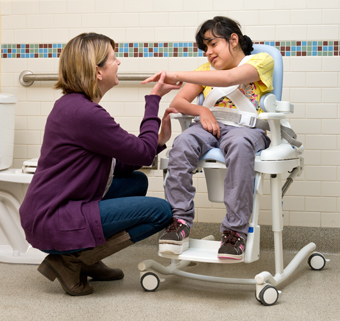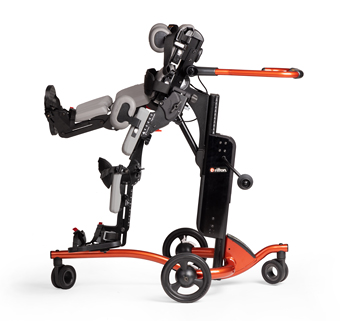Rifton TRAM and Safe Patient Handling
New University Pilot Study Features the TRAM
| March 2015Gerard Dybel PT, ScD, GCS, is an associate professor in the Department of Physical Therapy at the University of Massachusetts Lowell. His research interests include ergonomics, injury prevention in health care workers and the implementation of no-lift technology by physical therapists practicing in rehabilitation departments. He recently conducted a pilot study on safe patient handling (SPH) to evaluate the effect of training in the use of no-lift assistive device technology on the attitudes and clinical practice techniques of practicing physical and occupational therapists and on physical therapy students. One of the products incorporated in this study was the Rifton TRAM. This research was presented as a poster at the 2014 Massachusetts Physical Therapy Association’s annual meeting.
 Safe Patient Handling Study
Safe Patient Handling Study
The focus of this pilot study is injury prevention in rehab professionals resulting from patient lifting. The incidence of musculoskeletal injuries to health care workers as reported by OSHA has increased by 6% between 2011 and 2012. Additionally, reported musculoskeletal injury rates by physical and occupational therapists have been as high as 90%. Implementing an educational program to address the work culture of rehab professionals could reduce these injury rates.
By training health care workers in SPH techniques during their professional education and periodically during worker training programs, we encourage a culture of safety in the work environment. Demonstrating the use of safe patient handling technology to student therapists (during their didactic preparation) and to practicing therapists can increase the likelihood that therapists will include this technology in patient treatments sessions. In turn, routinely implementing safe patient handling technology in the rehabilitation process would create a safer work environment for the patient and therapists while enhancing patient functional skill development. This pilot study assessed student and therapists’ views on SPH in therapy practice.
The subjects for this study included 11 therapists (4 PT, 2 PTA, 3 OT, 2 COTA) and 17 second-year DPT students. The therapists were employed at the D’Youville Life and Wellness Community at the Center for Advanced Therapy in Lowell, Massachusetts. The students were second-year DPT students at UMass Lowell.
The subjects were surveyed and interviewed about their attitudes regarding the institutional policies of their current employer or educational institution regarding:
• Safe patient handling technologies
• The impact of SPH technologies on achieving optimal functional status of patients
• The frequency of training in SPH strategies at their employer/institution
The pilot study surveys and subject interviews were conducted both before and after hands-on product training, and then the responses to the questions were compared.
 For the training, subjects were instructed in the appropriate use of two SPH devices, the Rifton TRAM and a ceiling mounted lift device. In addition, the training included a video presentation demonstrating how the SPH devices can be integrated into patient rehabilitation.
For the training, subjects were instructed in the appropriate use of two SPH devices, the Rifton TRAM and a ceiling mounted lift device. In addition, the training included a video presentation demonstrating how the SPH devices can be integrated into patient rehabilitation.
The Benefits of Safe Patient Handling Technology
The surveys and interviews showed increased therapist appreciation of the value of SPH practices. In fact, certain survey questions demonstrated changes in subject responses that were statistically significant. Specifically, the subjects’ responses after training showed increased positivity that SPH would:
• make the treatment sessions more efficient
• have a positive impact on the patient’s functional capabilities
• increase the treatment environment safety
• increase the patient’s motivation when participating in rehab sessions
Furthermore, the students’ comments emphasized the importance of exposing new clinicians to no-lift technology while they were students. The training demonstrated to them how this technology could be integrated into therapy sessions and the importance of making the treatment environment safer for the patient and the therapists.
In conclusion, this pilot study demonstrated that training rehabilitation professionals and student therapists in the use of safe patient handling devices can positively impact attitudes towards using safe patient handling devices in the rehabilitation environment.
Survey Questions Demonstrating a Significant Change in Subject's Response Pre vs. Post Training |
| 1. The use of minimal lift technology will positively affect the efficiency of the treatment session. |
| 2. The use of minimal lift technology will positively affect patient functional outcomes. |
| 3. Therapists working in an inpatient neurological rehab environment are more likely to use minimal lift technology in their treatment sessions. |
| 4. Therapists working in an inpatient general medical rehab environment are more likely to use minimal lift technology in their treatment sessions. |
| 5. There are potential safety benefits for a patient when using minimal lift technology during treatment sessions. |
| 6. There is potential psychological benefit ie: increased motivation for a patient when using minimal lift technology in their treatment sessions. |




